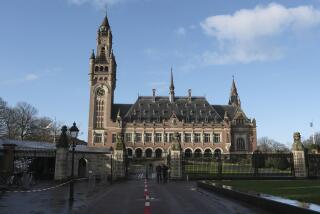Hong Kong-Beijing Dispute Deepens
- Share via
HONG KONG — Setting the stage for a constitutional crisis that will test the limits of Hong Kong’s judicial independence, a senior Chinese Cabinet official Monday attacked a ruling by the territory’s highest court granting the right of abode to thousands of mainland-born children whose parents live in Hong Kong.
“The decision of the Hong Kong court was a mistake and against the Basic Law,” Zhao Qizheng, director of the State Council Information Office, told reporters attending a reception in Beijing. Zhao said the ruling last month by Hong Kong’s Court of Final Appeal “should be changed.”
The Basic Law is the mini-constitution that has governed Hong Kong since Britain returned it to Chinese rule in 1997. The Cabinet official also said the government supported criticism of the ruling, reported in the official Chinese press, by four mainland legal experts who participated in the drafting of the Basic Law.
The legal debate centers on who has the right to interpret the Basic Law--the Hong Kong courts or the National People’s Congress, which is China’s parliament.
Hong Kong’s Democratic Party leader, Martin Lee, an outspoken critic of Beijing, quickly expressed his alarm over the statements.
“This is potentially the worst news to come out since the British and the Chinese first sat down to discuss the return of Hong Kong,” said Lee. “The worst-case scenario now is for the standing committee of the National People’s Congress to reinterpret the Basic Law and effectively overturn this ruling. If that happens, then there goes the rule of law in Hong Kong. This is not a time bomb, it is the atomic bomb.”
At the center of the disagreement, the most serious since Hong Kong reverted to Chinese control, is a ruling last month by the Court of Final Appeals that a child born in mainland China, but whose father or mother is a permanent resident of Hong Kong, enjoys the right to live in Hong Kong.
A Hong Kong government survey indicated that 320,000 people, mostly illegitimate children of Hong Kong fathers who keep mistresses on the mainland, fall into this category.
However, since most of these mainland-born offspring are also of childbearing age, the number of potential immigrants because of the ruling, according to some estimates, could surpass 500,000--or about 8% of Hong Kong’s current population. Such an influx would test the territory’s ability to absorb them.
Hong Kong government officials, including Chief Executive Tung Chee-hwa, oppose opening Hong Kong to this flood of new immigrants. In a radio interview after the ruling, Tung said it would have “far-reaching and adverse” effects on Hong Kong.
Mainland authorities, concerned that the new wave of immigration could disrupt Hong Kong’s economy, have also opposed allowing the mainland-born offspring to enter Hong Kong. The territory’s provisional legislature, installed by Beijing after the July 1, 1997, hand-over, introduced legislation that restricted these people’s right of abode in Hong Kong.
But the Court of Final Appeal, sitting in a five-judge panel under Chief Justice Andrew Li Kwok-nang, Hong Kong’s highest-ranking jurist, ruled that the postcolonial constitution clearly grants them the right of abode.
Although Hong Kong government officials grumbled about the implications of the ruling for the territory’s infrastructure, the big question was always how Beijing would react.
Hints that Beijing was upset by the ruling first came late Saturday when the official New China News Agency quoted a panel of mainland legal experts as saying that the ruling violated the Basic Law and was an attempt to turn Hong Kong into an independent political entity.
One of the mainland experts, Beijing University professor Xiao Weiyun, said the ruling was “in direct opposition to the interest of Hong Kong residents and has hindered efforts to maintain stability and prosperity.”
The Court of Final Appeal ruling was clearly an attempt by the Hong Kong court to establish itself as the final arbiter of constitutional questions. However, Xiao said that task rests with the National People’s Congress.
“No organization or department can challenge National People’s Congress legislation and decisions,” he said.
More to Read
Sign up for Essential California
The most important California stories and recommendations in your inbox every morning.
You may occasionally receive promotional content from the Los Angeles Times.













